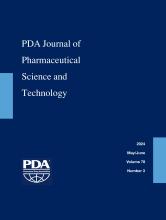Abstract
Leachables in pharmaceutical products may react with biomolecule active pharmaceutical ingredients (APIs), for example, monoclonal antibodies (mAb), peptides, and ribonucleic acids (RNA), potentially compromising product safety and efficacy or impacting quality attributes. This investigation explored a series of in silico models to screen extractables and leachables to assess their possible reactivity with biomolecules. These in silico models were applied to collections of known leachables to identify functional and structural chemical classes likely to be flagged by these in silico approaches. Flagged leachable functional classes included antimicrobials, colorants, and film-forming agents, whereas specific chemical classes included epoxides, acrylates, and quinones. In addition, a dataset of 22 leachables with experimental data indicating their interaction with insulin glargine was used to evaluate whether one or more in silico methods are fit-for-purpose as a preliminary screen for assessing this biomolecule reactivity. Analysis of the data showed that the sensitivity of an in silico screen using multiple methodologies was 80%–90% and the specificity was 58%–92%. A workflow supporting the use of in silico methods in this field is proposed based on both the results from this assessment and best practices in the field of computational modeling and quality risk management.
- Computational methods
- Covalent interaction
- Biomolecule active pharmaceutical ingredients
- Monoclonal antibodies
- Predictive methods
- Extractables
- Leachables
- © PDA, Inc. 2024
PDA members receive access to all articles published in the current year and previous volume year. Institutional subscribers received access to all content. Log in below to receive access to this article if you are either of these.
If you are neither or you are a PDA member trying to access an article outside of your membership license, then you must purchase access to this article (below). If you do not have a username or password for JPST, you will be required to create an account prior to purchasing.
Full issue PDFs are for PDA members only.
Note to pda.org users
The PDA and PDA bookstore websites (www.pda.org and www.pda.org/bookstore) are separate websites from the PDA JPST website. When you first join PDA, your initial UserID and Password are sent to HighWirePress to create your PDA JPST account. Subsequent UserrID and Password changes required at the PDA websites will not pass on to PDA JPST and vice versa. If you forget your PDA JPST UserID and/or Password, you can request help to retrieve UserID and reset Password below.






